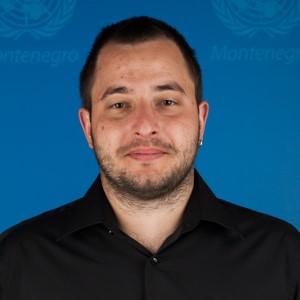Raul has been living in Montenegro for almost a year, after fleeing political persecution in Cuba with his wife and two children. Eight months into their stay at a centre for asylum-seekers, the family left to go it alone – a daunting task so far away from home and without sufficient knowledge of the local language.
But, along with other refugees in Podgorica, Raul participated in a workshop organized by UNHCR, the Refugee Agency, and the Employment Office of Montenegro, to support their integration.
The workshop consisted of group sessions and individual consultations with the participants, mapping their skills and interests to the job market. Afterwards, the participants also attended a five-day intensive Montenegrin language course, funded by UNHCR and tailored to help them acquire the basics of the language to allow them to interact with their prospective employers and co-workers.
“I am determined to make my life here, or at least give it a try.”
Yaster
“It was quite short, but we learned a lot,” says Raul. “Earlier on, I could barely understand a word of Montenegrin, but I felt a significant improvement after the course. Now we have an opportunity to socialize more when we go out.”
Raul recently landed a job at the municipal waste collection company.
“This job came at the right moment, as I had been looking out for a way to start earning once we leave the centre. It is not an ideal job, as I work the whole morning in the strong sun, walking up to 10 kilometres of streets – but I have a family to support.”
The workshop also enabled another Cuban refugee find work. Yaster, 34, received refugee status in Montenegro in December 2016. He also stayed at the centre for several months, but now lives in private accommodation supported by UNHCR through a cash-based intervention on a six-month basis. Although he is a qualified nurse, Yaster makes his living in Montenegro by working at the municipal waste collection company.
“I really try to communicate in the local language whenever I can.”
Raul
“I am aware that I am on my own now, so I needed anything just to get started,” he says. “It’s difficult to work in the sun, so I take short breaks in the shade every now and then.”
Yaster also attended the Montenegrin course and has since been trying to improve his command of the language by chatting with co-workers.
“I really try to communicate in the local language whenever I can,” he says. “Actually, that’s in most cases the only way we can interact, as English is not an option. I understand better than I speak, so I try to listen to conversations and pick up new words I hear around me. I am determined to make my life here, or at least give it a try.”
The collaboration between UNHCR and the Employment Office began in early 2017 and was formalized in June through a Memorandum of Understanding, which seeks to assist newly recognized refugees in their social and economic integration.
“Through this Memorandum we aim to provide support to the Government of Montenegro in boosting integration prospects of newly-recognized refugees, so they can become self-reliant through income generating activities,” says Roberta Montevecchi, UNHCR Representative in Montenegro. “Refugee protection and livelihoods are closely intertwined, so we believe that this initiative will help Montenegro develop a fully-functioning system that reduces the risk of refugees depending on external assistance.”
While there has not been a large number of refugees arriving to Montenegro, there are still people fleeing conflict or persecution who seek to re-build their lives in safety in this tiny Adriatic country.
“This is a beautiful country and, most importantly, my children can walk freely on the streets and play in safety,” says Raul.




